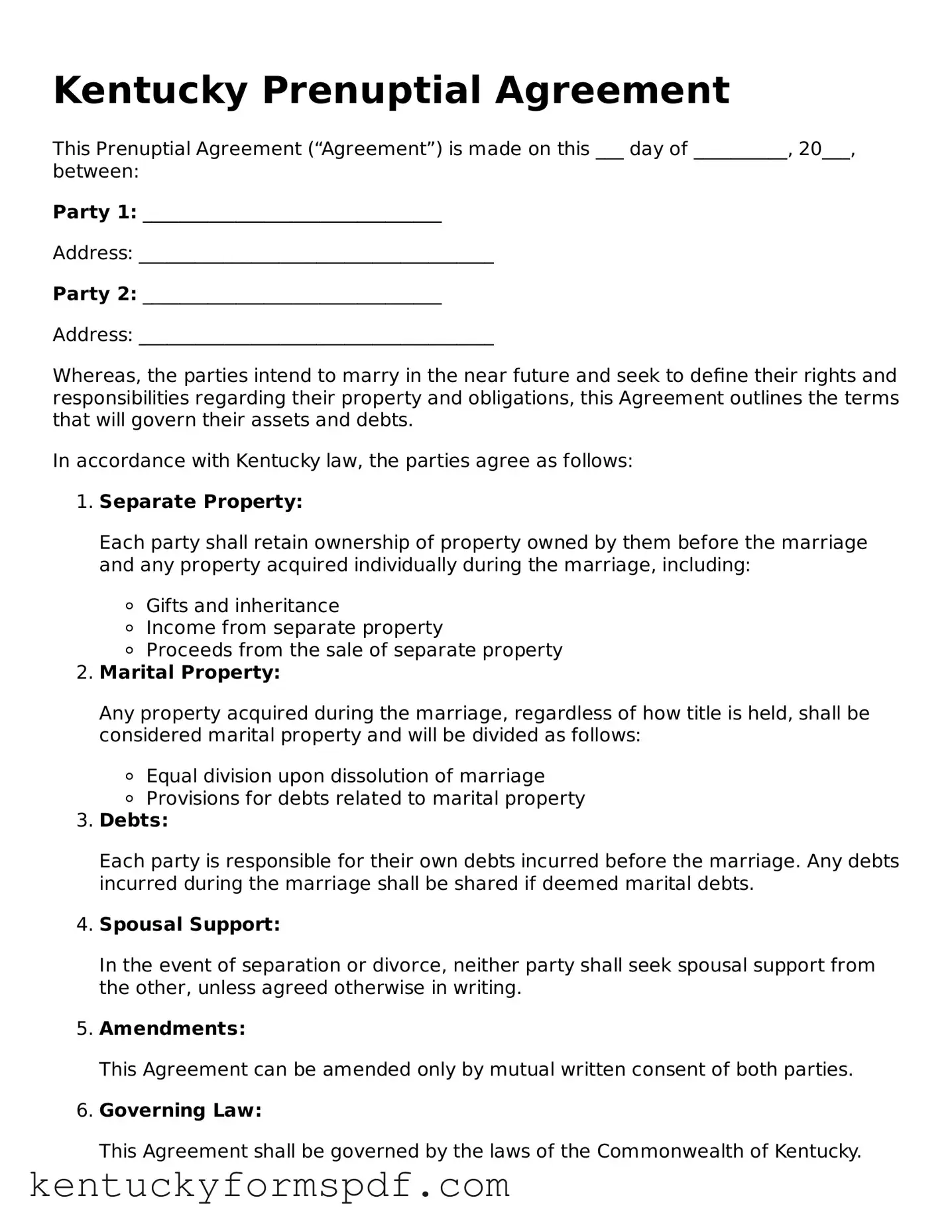What is a prenuptial agreement in Kentucky?
A prenuptial agreement, often called a prenup, is a legal contract created by two individuals before they get married. This document outlines how assets and debts will be divided in the event of divorce or separation. In Kentucky, prenups can also address issues like spousal support and property rights, providing clarity and security for both parties entering into marriage.
Why should I consider a prenuptial agreement?
Many couples choose to create a prenuptial agreement to protect their individual assets and ensure a fair division of property should the marriage end. This is particularly important for individuals with significant assets, business interests, or children from previous relationships. A prenup can help prevent misunderstandings and conflict during a difficult time.
What should be included in a Kentucky prenuptial agreement?
While each prenup can be tailored to the couple's unique circumstances, common elements include the identification of separate and marital property, the division of assets and debts, provisions for spousal support, and how future income will be handled. It’s crucial to ensure that the agreement is comprehensive and reflects both parties' intentions.
Are there any requirements for a prenuptial agreement in Kentucky?
Yes, Kentucky law requires that a prenuptial agreement be in writing and signed by both parties. Additionally, it must be entered into voluntarily, without coercion or undue pressure. Full disclosure of assets and debts is also essential to ensure that the agreement is enforceable in court.
Can a prenuptial agreement be modified after marriage?
Absolutely. A prenuptial agreement can be modified or revoked at any time after marriage, provided both parties agree to the changes in writing. This flexibility allows couples to adapt their agreement as their circumstances evolve over time.
What happens if a prenuptial agreement is challenged in court?
If a prenup is challenged, a court will examine several factors to determine its validity. These factors may include whether there was full disclosure of assets, whether the agreement was signed voluntarily, and whether it is fair and reasonable. If the court finds the prenup to be valid, it will be enforced according to its terms.
How can I ensure my prenuptial agreement is enforceable?
To increase the likelihood that your prenuptial agreement will be enforceable, consider the following steps: work with a qualified attorney who specializes in family law, ensure both parties have independent legal representation, provide full financial disclosure, and avoid any provisions that are illegal or unconscionable.
Is a prenuptial agreement only for wealthy individuals?
No, prenuptial agreements are not just for wealthy individuals. They can benefit anyone who wants to protect their assets, clarify financial responsibilities, or outline how property will be divided. Couples with modest assets may also find value in establishing clear expectations and reducing potential conflict.
How do I start the process of creating a prenuptial agreement?
The first step in creating a prenuptial agreement is to have an open and honest conversation with your partner about your financial situations and goals. After that, it is advisable to consult with a family law attorney who can guide you through the legal requirements and help draft an agreement that meets both parties' needs.
Can I use a prenuptial agreement from another state in Kentucky?
While it is possible to use a prenuptial agreement from another state, it’s essential to ensure that it complies with Kentucky law. Each state has its own legal standards and requirements for prenuptial agreements. Therefore, consulting with a Kentucky attorney can help determine if the existing agreement is valid or if modifications are necessary.

